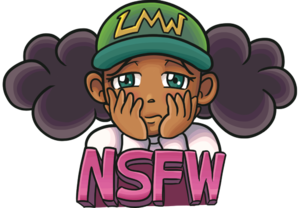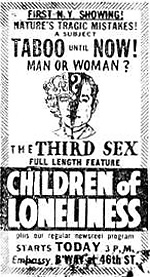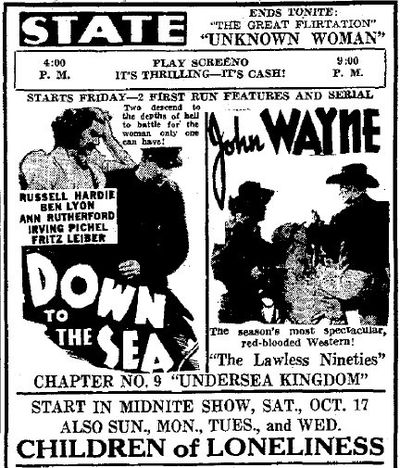Children of Loneliness (lost exploitation film; 1937)
Children of Loneliness is a 1937 exploitation melodrama film written and directed by Richard C. Kahn.[1]
Inspired by the 1928 novel The Well of Loneliness, the picture is also notable for being one of the first films to explore the subject of homosexuality.
It has never appeared in any form online or on home video, and it is not known to exist in any archives.
Premise
The film revolved around Bobby, a vindictive lesbian obsessed with her roommate, Eleanor, who works in a law office. A parallel story revolves around a young woman at the same law firm who falls for a homosexual male artist. The homosexual characters don't fare well in the story. The male artist commits suicide after being told he could never have a normal marriage. The two female characters enter a conflict resulting in Bobby attempting to throw acid on Eleanor, only to have it land on her own face. Blinded, she runs into the street and is hit by a car and killed.
Screenings
Occasionally after screenings of Children of Loneliness, a doctor would come out into the audience to sell pamphlets designed to explain, and likely "cure", homosexuality. As the topic of homosexuality was becoming much more pervasive in American culture by the 1930s, these movies took advantage of the moment to exploit popular interests.
It is unknown what those who didn't identify as a heterosexual thought of such films in the 1930s. Some suspect that they were not ashamed of their beliefs, despite the scorn of the public in this time period, and may have viewed the films as a form of "disidentification."[2] According to the book "Bold! Daring! Shocking! True!": A History of Exploitation Films, 1919-1959," gay viewers may have sought the film out and found it amusing. [3]
External Link
- Wikipedia article on Well of Loneliness. Retrieved 15 Mar '16
- American Film Institute article about the film
- The film's IMDB page
References
- ↑ Library of Congress article on Children of Loneliness. Retrieved 30 Oct '20
- ↑ Queer Museum article about the film. Retrieved 15 Mar '16
- ↑ Mention in the book "Bold! Daring! Shocking! True!": A History of Exploitation Films, 1919-1959 Retrieved 20 May '21


